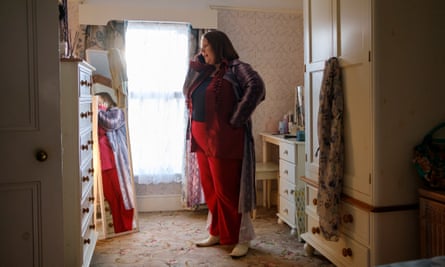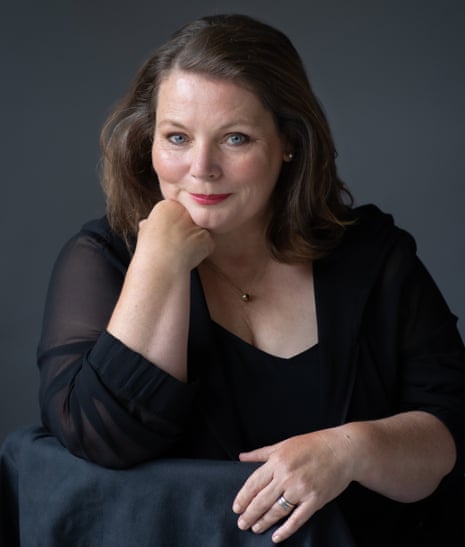When the actor Joanna Scanlan was four years old, she had an epiphany. She recalls standing on stage at her north Wales convent school reciting a poem and “in that moment feeling transported to another realm of existence. I remember thinking: ‘I prefer it here.’ The reality is that I still feel that way. As much as I love my life, I do prefer to be in the realm of the imagination. It is the place where I am my truest self.”
Scanlan, who is 61, is installed in a meeting room at her publicist’s office in Soho, London. It has been a long morning of interviews, but if she is tired of talking she is too nice to show it; her default setting is sunny and self-effacing. She is here to discuss The Light in the Hall, a psychological thriller set in Carmarthenshire which has been shot in English and Welsh (Scanlan learned her lines with the help of her Welsh-speaking niece). She plays Sharon, whose teenage daughter, Ela, was murdered 18 years ago. A local gardener, Joe Pritchard (Game of Thrones’ Iwan Rheon) was convicted of the crime, but never revealed why he did it or what he did with the body. When he is released on parole, Sharon determines to find out what happened to her child.
Researching the role, Scanlan read a series of victim personal statements in murder cases, where relatives of the dead explain how the crime has affected them. “They are the most gut-punching pieces of writing I think I’ve ever read,” she says. “This isn’t dialogue from a TV drama or a novel. This is people’s lives. They are there as a voice for the lost life, and the continual loss of life that is played out within a family when a person is killed.”
The series delves deep into the notion of truth and how it can become warped when a crime is committed. Scanlan has first-hand experience of this, having witnessed the assault of a male friend in a pub when she was a student. A man passing their table had knocked his pint to the floor, seemingly on purpose, and a fight ensued. Her friend was so badly beaten that he had to go to hospital, and Scanlan made a police statement. A few months later, she was called to give evidence in court.
“I was sitting outside waiting to be called in and there was a bloke sitting beside me who was the weediest-looking guy imaginable,” she says. “I thought he was one of the solicitor’s team. But then our representative came out and asked if I wanted to re-read the statement I had made on the night of the crime. So I read it and there, in my own words, was a perfect description of the man who had been sitting beside me.” Scanlan lets out a horrified laugh. “So, in the gap between the guy punching my friend and me being hauled into court to give evidence, I had reimagined this bloke as fucking Arnold Schwarzenegger!”

In court, Scanlan learned more about the perpetrator and found herself feeling sympathy for him: he had a young family and had recently lost his job. “I mean, the incident shouldn’t have happened,” she says, “but I had made so many internal judgments about the perpetrators of crime, and I had mapped that on to the reality we were now looking at. So, in playing Sharon, this question of how we judge perpetrators of crime, and what contexts and mitigation there may be, was strong in my mind.”
The Light in the Hall is Scanlan’s first major role since winning a Bafta for best leading actress in After Love, Aleem Khan’s film which cast her as a widow from Dover who discovers her late husband, a ferry captain, had a secret family in Calais. The film critic Mark Kermode described her performance as “a masterclass in the dramatic power of understatement”.
On picking up her award, Scanlan said: “Some stories have surprise endings, don’t they?” “Well, I really had surprised myself,” she says now. “For a start, I had never imagined playing a leading role. But I also started acting very late – I didn’t perform professionally until I was 35 – so I’ve always had this sense of running to catch up. If someone said to me now that they were thinking of becoming an actor in their mid-30s, I’d probably say: ‘That boat may well have sailed.’”
Since her breakout role as Terri, the put-upon civil servant in The Thick of It, Scanlan has rarely wanted for work: she has played a ward sister in the hospital sitcom Getting On (which she also co-wrote); an exasperated detective in Paul Abbott’s No Offence; a mother superior in Mark Gatiss and Steven Moffat’s Dracula; and a cheerful farmer’s wife in The Larkins. Still, she has lost count of the projects she has been involved with that never got off the ground or simply failed to capture viewers’ imaginations. “There’s a lot of snakes and ladders in this game. You do something wonderful and then – bam! – it’s cancelled. So in that sense, the surprise of getting a Bafta was real. Here I was standing on stage as a leading lady being honoured by my peers. I still think to myself: ‘Did that really happen?’”
It was, famously, a doctor who persuaded Scanlan to pursue acting. Prior to that, she had worked at Leicester’s De Montfort University and, later, at the Arts Council. At 29, she was signed off work following a bout of depression and extreme fatigue. The doctor in question asked her whether she had ever wanted to do anything else with her life. When she said she had wanted to act, he told her: “If you don’t do this, you will be ill for the rest of your life.” His words were “like an arrow going straight into my sternum. I didn’t doubt him at all.”
Scanlan describes her early childhood as “idyllic”: she grew up in rural Cheshire “surrounded by animals and no people” and spent most of her time outdoors. “That time spent finding fairy rings, jumping over rivers, being stung by nettles 100 times a day; I think my inner self was forged in that landscape.”
after newsletter promotion
When she was 13, her parents bought a hotel in Ruthin, north Wales. Throughout her teens, she worked every job going: cleaner, waitress, bartender, receptionist. “Hotels are much like theatres in that everyone is playing a role,” she says. “I would stand behind the bar polishing glasses and eavesdropping on people’s lives. I found them totally absorbing and I learned so much about people, which clearly fed into what I do now.” And what of her career now, as a Bafta-winning actor? No Offence writer Abbott said recently that Scanlan was “about to go ballistic. We’ll see her disappearing off into Netflix and Hollywood now.” She looks thoughtful when I mention this. “It’s a strangely stratified world, our industry, and awards mean you get on new lists. I have always put excellence and creativity first, and I’ve been lucky enough that around 80% of what I’ve done has been really good. But now I’m in this luxurious position of being considered a leading actor, and that is tremendously exciting.”
It is different, she adds, when you have a supporting part, which means “you’re just in and out [on set]. What comes with a leading role is that sense of responsibility for the whole. You’re there with the crew from beginning to end, and there’s something about that that suits me.”
While sitting in a taxi early this morning, Scanlan found herself idly thinking about the kind of roles she hasn’t yet done, but would like to. “I have always played people who are under the radar,” she reflects. “I get packaged as quite ordinary. So I would really like to harness my power. I don’t think I’ve played many characters with real welly. I feel like there is this rageful power [in me] that could be quite compelling that hasn’t been unleashed. But now I think I’m ready.”
The Light In the Hall is on Channel 4 from 4 January at 9pm and streams on All 4.
